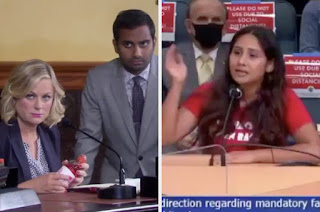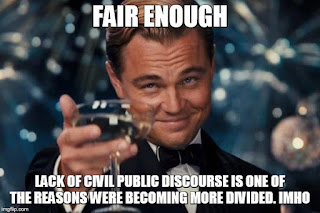Sorry, I Can't Hear Over All This Public Discourse!
It seems like the more experience with the world I have, the more I start to see how incredibly accurate Parks and Recreation's portrayal of government discourse is. Unfortunately, it is a lot less funny to live this reality than see it play out on a screen. Specifically, I'm talking about how oversaturated and meaningless public discourse has become, not that it was ever perfect in the first place--we're definitely not experiencing anything new in terms of how nonsensical people can be, that 's just how we are. However, there is an addition to the public discourse of our time: we have the most efficient means of communication and media ever and an itch for things that will keep our short attention spans engaged. This is how we decide what topics we want to discuss; we either present or are distracted by arguments that serve to rile us up without ever getting anywhere, influenced heavily by our culture of entertainment. And because I admittedly rely heavily on entertainment media to distract me from my reality, I'm going to include a small example of this that comes from an episode of It's Always Sunny. Here's a clip of the scene if you'd like to watch it (the example starts at 1:03):
Summing up the scene quickly, the employees of "Paddy's Pub" want to be included more when it comes to decisions being made about the pub; they're worried that the owner Frank is not budgeting the finances well. Frank accepts this easily, but when they sit down to make decisions he keeps distracting them from the issue of money by focusing them on smaller, less important issues, like the dead dog outside or the width of the lime slices. In conclusion, they spend the whole scene passionately debating issues that don't matter while Frank looks on and occasionally stokes the fire, making sure nothing gets done.In a culture that is oversaturated with voices, opinions, debates, etc., "public discussion becomes cluttered with the trivial, the mundane, the uninformed, and the personal" (Donnelly, "Publicness & Models of the Public Sphere"). And since we are in the age of entertainment, often-times the stories that are broadcasted and amplified are ludicrous and largely unimportant, with the sole goal of attracting attention or proving one's superiority. As discussed previously, this is a tactic that the elites of society can use to their advantage, taking the spotlight off of them and instead redirecting it on random issues, especially ones that use minoritized people as a scapegoat. While you're arguing that Mexican immigrants are the reason you're not in a higher position of society, wealthy white people are laughing at you on their double-decker yachts.
(Here comes the metaphor)
Public discourse is basically noise pollution, just in a different format. With so much going on in our public discourse, everything can become overwhelmingly loud when we try to engage in it; it feels like we need to yell in order for our voices to be heard. We've been steadily getting more accustomed to an entertainment-based type of discourse that hinges on participants being as loud as possible because we're constantly exposed to it; hostile news debates and closed-off communication is the norm, and it's not a good thing.
But, as we saw in the explanation of sound measurements, loudness is not shared equally. Some people have tools that allow them to amplify their dB; picture a very privileged person that owns a jackhammer (90 dB) vs a marginalized person who only has their voice (60 dB). When the person with only their voice attempts to speak up, the overprivileged person can effectively mute them and draw the attention of the majority. Unless you're already close to the person who is speaking or you're actively trying to hear them, they won't even register as a noise. Even if an underprivileged person attains a way to make themselves louder, via nationwide protests for example, we then complain that they're too noisy. So, I would argue that the issue with public discourse isn't simply that it's too inclusive and allows too many voices in the arena nowadays--the problem is that the voices/opinions we hear are controlled by whoever is the loudest, and the loudest people are the most privileged.
Public discourse makes us agitated and depressed, and it's understandable why; consuming conflicting ideas being virtually and non-virtually shouted in a back-and-forth debate non-stop can grate on a person's patience/well-being, especially when we seem to be unable to escape it. It's even more infuriating to see issues that you think don't really matter being treated like the most important topics of debate. However, there's not really an easy solution either; with something like physical noise pollution, you could protect yourself by blocking out the sound via headphones/earplugs. But when it comes to public discourse, blocking out the noise completely doesn't seem like a possible, or at least intuitive, way to deal with it--after all, the things being discussed could potentially create changes both locally and nationally. Perhaps some advice could be to be to block out nonsensical arguments and instead be on the lookout for voices you don't normally hear from--remove an earbud to listen to what they have to say.






Your metaphor for public discourse is spot-on. I had never thought of it in that manner, so I appreciate you connecting the dots for me!
ReplyDeleteYour post got me thinking about how one can effectively minimize the negative impacts that public discourse creates. I know you mentioned a tactic including blocking out nonsensical arguments, but how does one effectively block these out without first listening to determine if they are, indeed, nonsensical? I began to wonder if it would be efficient to simply avoid certain people, take politicians for example, who have a negative reputation when it comes to their participation in public discourse. This is something I chose to do, for the most part, when it came to Donald Trump. Although he held such a high standing, and was supposed to be a person to deliver important and relevant information, I found myself avoiding many articles, videos, and tweets that he produced simply because most of them were nonsensical; however, it took me reading many of these same productions to come to that conclusion.
Your reference to "Its Always Sunny" is very clever. It reminds me of what we talked about in class today, regarding the presidential debate, in terms of creating screaming matches between the participants. Much like the mentioned TV show, which was created solely for entertainment purposes, I feel as though the presidential debate was conducted in the same manner - it was a joke. I'm not sure how this issue can be resolved in real life, as it is impossible to truly control the tendencies of others; however, I hope we can soon make progress as a country to avoid creating screaming matches out of important, historical conversations solely for the unlabeled purpose of entertainment.
First off, the "Its Always Sunny" was PERFECT for completing your metaphor. It is exactly like how we use public discourse, especially in debates between various politicians (like the past presidential debates that we have been talking about in class). It almost makes it feel like the people involved in the debates are unknowledgeable about the subject. Instead, they consistently use ad hominem screaming matches to try and seem like the better "man," when in fact, all they are doing are making society roll their eyes and allow the crazies to come out.
ReplyDeleteThe idea that you have presented that public discourse is just noise pollution, and society needs to weed out nonsensical arguments, would indeed bring about a better public world. However, it would be very hard to distinguish between what is considered "nonsensical" and what is considered legitimate. After all, we are a country who "prides" themselves on "free speech." It would be hard to get everyone on the same boat, which brings us to a never-ending loop of noise pollution in the form of public discourse.
I wonder how we'd go about leveling this playing field... (without using the rich's jackhammers to dig their pedestal out from under them). The loudest people are those with social and political power, and as I pondered how to make them feel a bit more like us plebeians, I remembered a screenshot I keep saying that says something to the effect of "I wonder what would happen if one day Kim K posted a selfie and it got like only 6 likes, fr".
ReplyDeleteOur short attention spans are totally captured by these people's lives because their stories are so different from ours. In a way, our pauper-y stress-relief (or maybe just for me, stress inducement), aka social media, enables the rich and famous to become even *more* rich and famous by giving them our attention. Their voices are loud because, well, the average person prefers to listen to people (celebs) with fancy, flashy images because it gives us a break from our mundane lives.
It's like our Electoral College. They choose to ignore the ordinary people screaming in their ears, "DON'T VOTE FOR THE TALKING ORANGE!" (cause, hey, he did lose the popular vote). power equals voice in today's society, because the powerful have access to the tools and positions necessary to influence the top of our hierarchy.
Like you said, the best way to enable those underprivileged voices is to listen to the everyday people around us, not only what the media filter-feeds us.
And maybe if "the 99%" all scream at the same time, we can overcome that dang jackhammer.